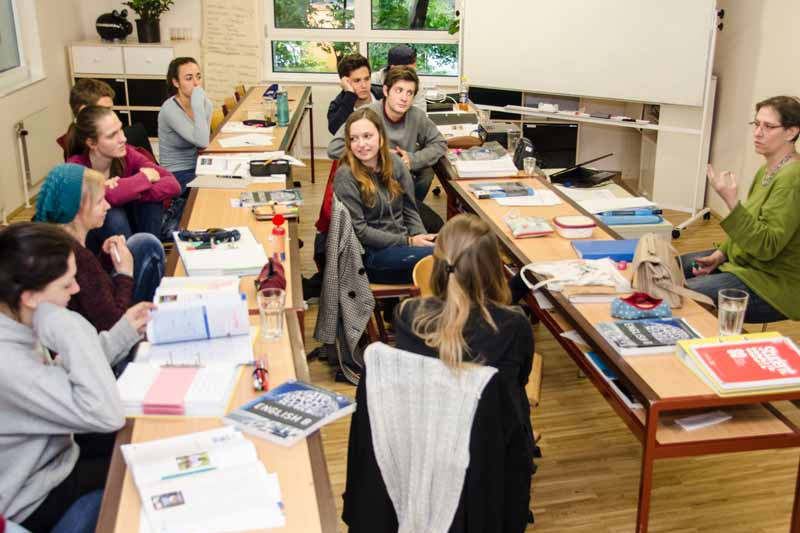Jointly Preparing for University: Waldorf and Montessori under One Roof

The school “Campus Wien West” in Vienna, Austria combines Waldorf and Montessori students under one roof, where they prepare jointly to take the International Baccalaureate, a university entrance examination. Alanus University carried out a scientific study of the pioneering phase of this unique program – and the results are extremely positive.
Since the school year 2013/14, young people between the ages of 16 and 19 have been preparing for university entrance at the Campus Wien West (CWW) in Vienna. The “International Baccalaureate Diploma Programme” (IBDP) is an internationally recognized equivalent to the German Abitur or Austrian Matura degree. Both cooperation partners of the CWW, the Waldorf School Wien West and the Montessori Campus Wien, had started to develop a high school program at about the same time. Both were searching for an alternative format and a university entrance certificate that would suit their particular progressive educational approach. With the Campus Wien West, they are now treading new ground together.
Gradual Integration
The aim of both types of institutions – to promote learning that is as independent and holistic as possible – is clearly reflected in the curriculum. For example, within the context of “Creativity Activity Service” (CAS), all students complete 150 hours in the area of art, sports, or civic service. Also compulsory is an extensive project on a freely chosen theme. Art and math are taught in English, and the CAS learning diary must also be written in English. After the two-year preparation period, an examination takes place carried out by the Geneva-based International Baccalaureate Foundation. In both of the current graduating classes there is one Waldorf and one Montessori group, as it was discovered that it was not immediately possible to combine both groups for all subjects, due to their different approaches. The school is now adopting a gradual approach to integrating the groups. Starting with the school year 2016/2017, all students will have math class together. There are also joint exhibition visits and excursions.
Scientific Support by Alanus University
With financing from the Software AG Foundation, Alanus University has been scientifically observing Campus Wien West since its start in 2013. The process evaluation is based on written evaluations by students (n = 40), teachers (n = 10), and parents (n = 40). One important result is that the students feel supported and recognized by the teachers to a large extent (97.3% agreement), and they personally value the program very highly. The greatest burden was, in the students' view, the amount of learning material to be absorbed. From the parents' perspective, however, the students were not overwhelmed, and in their view the transition from previous school forms went very well.
Highly Valued by Students
A large majority of the students are satisfied with their own development and they value their school culture. Almost 100 percent rate their relationship with their teachers as good and feel that the teachers support them and take them seriously. The school organization is seen positively overall, as well, although many students wish for a greater diversity of school subjects. About 70 percent found their different previous experiences helpful for the working atmosphere (30% full agreement, 40% agree somewhat). A desire for more courses that Waldorf and Montessori students can attend together has not been very strong to date, but shows an increasing trend. The parents who completed the questionnaire (about a quarter of all parents) assessed the learning and personal development of their children positively. They were generally satisfied with the level of teacher support, the organization of the school, and the teaching quality. For teachers, the initial phase of integrating the two school cultures was a significant challenge. Separation into one Montessori group and one Waldorf group initially made things considerably easier, but the school remains committed to merging the two organically. After a successful start, the Campus Wien West hopes that the unique enrichment offered by this form of pedagogical diversity will be, in the future, further strengthened by the increasing integration of both school cultures.
About the study authors: Dirk Randoll is Professor of Education with an emphasis on quantitative empirical social research. Jürgen Peters is a special instructor at the Institute for Education and Empirical Education and Social Research.
Both authors are instructors at Alanus University and have published this article in the semester magazine “Universalis”.
